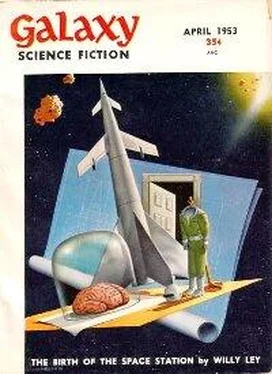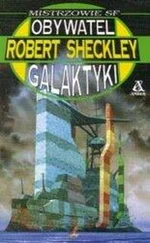Robert Sheckley - Seventh Victim
Здесь есть возможность читать онлайн «Robert Sheckley - Seventh Victim» весь текст электронной книги совершенно бесплатно (целиком полную версию без сокращений). В некоторых случаях можно слушать аудио, скачать через торрент в формате fb2 и присутствует краткое содержание. Год выпуска: 1953, Издательство: Galaxy Publishing Corporation, Жанр: Фантастика и фэнтези, на английском языке. Описание произведения, (предисловие) а так же отзывы посетителей доступны на портале библиотеки ЛибКат.
- Название:Seventh Victim
- Автор:
- Издательство:Galaxy Publishing Corporation
- Жанр:
- Год:1953
- ISBN:нет данных
- Рейтинг книги:4 / 5. Голосов: 1
-
Избранное:Добавить в избранное
- Отзывы:
-
Ваша оценка:
- 80
- 1
- 2
- 3
- 4
- 5
Seventh Victim: краткое содержание, описание и аннотация
Предлагаем к чтению аннотацию, описание, краткое содержание или предисловие (зависит от того, что написал сам автор книги «Seventh Victim»). Если вы не нашли необходимую информацию о книге — напишите в комментариях, мы постараемся отыскать её.
Seventh Victim — читать онлайн бесплатно полную книгу (весь текст) целиком
Ниже представлен текст книги, разбитый по страницам. Система сохранения места последней прочитанной страницы, позволяет с удобством читать онлайн бесплатно книгу «Seventh Victim», без необходимости каждый раз заново искать на чём Вы остановились. Поставьте закладку, и сможете в любой момент перейти на страницу, на которой закончили чтение.
Интервал:
Закладка:
Frelaine stood up and paced for a few moments. Then he read the letter again. Janet-Marie Patzig. No mistake. A girl. Three photographs were enclosed, her address, and the usual descriptive data.
Frelaine frowned. He had never killed a female.
He hesitated for a moment, then picked up the telephone and dialed.
“Emotional Catharsis Bureau, Information Section,” a man’s voice answered.
“Say, look,” Frelaine said. “I just got my notification and I pulled a girl. Is that in order?” He gave the clerk the girl’s name.
“It’s all in order, sir,” the clerk replied after a minute of checking micro-files. “The girl registered with the board under her own free will. The law says she has the same rights and privileges as a man.”
“Could you tell me how many kills she has?”
“I’m sorry, sir. The only information you’re allowed is the victim’s legal status and the descriptive data you have received.”
“I see.” Frelaine paused. “Could I draw another?”
“You can refuse the hunt, of course. That is your legal right. But you will not be allowed another Victim until you have served. Do you wish to refuse?”
“Oh, no,” Frelaine said hastily. “I was just wondering. Thank you.”
He hung up and sat down in his largest armchair, loosening his belt. This required some thought.
Damn women, he grumbled to himself, always trying to horn in on a man’s game. Why can’t they stay home?
But they were free citizens, he reminded himself. Still, it just didn’t seem feminine.
He knew that, historically speaking, the Emotional Catharsis Board had been established for men and men only. The board had been formed at the end of the fourth world war—or sixth, as some historians counted it.
At that time there had been a driving need for permanent, lasting peace. The reason was practical, as were the men who engineered it.
Simply—annihilation was just around the corner.
In the world wars, weapons increased in magnitude, efficiency and exterminating power. Soldiers became accustomed to them, less and less reluctant to use them.
But the saturation point had been reached. Another war would truly be the war to end all wars. There would be no one left to start another.
So this peace had to last for all time, but the men who engineered it were practical. They recognized the tensions and dislocations still present, the cauldrons in which wars are brewed. They asked themselves why peace had never lasted in the past.
“Because men like to fight,” was their answer.
“Oh, no!” screamed the idealists.
But the men who engineered the peace were forced to postulate, regretfully, the presence of a need for violence in a large percentage of mankind.
Men aren’t angels. They aren’t fiends, either. They are just very human beings, with a high degree of combativeness.
With the scientific knowledge and the power they had at that moment, the practical men could have gone a long way toward breeding this trait out of the race. Many thought this was the answer.
The practical men didn’t. They recognized the validity of competition, love of battle, strength in the face of overwhelming odds.
These, they felt, were admirable traits for a race, and insurance toward its perpetuity. Without them, the race would be bound to retrogress.
The tendency toward violence, they found, was inextricably linked with ingenuity, flexibility, drive.
The problem, then: To arrange a peace that would last after they were gone. To stop the race from destroying itself, without removing the responsible traits.
The way to do this, they decided, was to rechannel Man’s violence.
Provide him with an outlet, an expression.
The first big step was the legalization of gladiatorial events, complete with blood and thunder. But more was needed. Sublimations worked only up to a point. Then people demanded the real thing.
There is no substitute for murder.
So murder was legalized, on a strictly individual basis, and only for those who wanted it. The governments were directed to create Emotional Catharsis Boards.
After a period of experimentation, uniform rules were adopted.
Anyone who wanted to murder could sign up at the ECB. Giving certain data and assurances, he would be granted a Victim.
Anyone who signed up to murder, under the government rules, had to take his turn a few months later as Victim—if he survived.
That, in essence, was the setup. The individual could commit as many murders as he wanted. But between each, he had to be a Victim. If he successfully killed his Hunter, he could stop, or sign up for another murder.
At the end of ten years, an estimated third of the world’s civilized population had applied for at least one murder. The number slid to a fourth, and stayed there.
Philosophers shook their heads, but the practical men were satisfied. War was where it belonged —in the hands of the individual.
Of course, there were ramifications to the game, and elaborations. Once its existence had been accepted it became big business. There were services for Victim and Hunter alike.
The Emotional Catharsis Board picked the Victims’ names at random. A Hunter was allowed six months in which to make his kill. This had to be done by his own ingenuity, unaided. He was given the name of his Victim, address and description, and allowed to use a standard caliber pistol. He could wear no armor of any sort.
The Victim was notified a week before the Hunter. He was told only that he was a Victim. He did not know the name of his Hunter. He was allowed his choice of armor, however. He could hire spotters. A spotter couldn’t kill; only Victim and Hunter could do that. But he could detect a stranger in town, or ferret out a nervous gunman.
The Victim could arrange any kind of ambush in his power to kill the Hunter.
There were stiff penalties for killing or wounding the wrong man, for no other murder was allowed. Grudge killings and gain killings were punishable by death.
The beauty of the system was that the people who wanted to kill could do so. Those who didn’t —the bulk of the population—didn’t have to.
At least, there weren’t any more big wars. Not even the imminence of one.
Just hundreds of thousands of small ones.
Frelaine didn’t especially like the idea of killing a woman; but she had signed up. It wasn’t his fault. And he wasn’t going to lose out on his seventh hunt.
He spent the rest of the morning memorizing the data on his Victim, then filed the letter.
Janet Patzig lived in New York. That was good. He enjoyed hunting in a big city, and he had always wanted to see New York. Her age wasn’t given, but to judge from her photographs, she was in her early twenties.
Frelaine phoned for jet reservations to New York, then took a shower. He dressed with care in a new Protec-Suit Special made for the occasion. From his collection he selected a gun, cleaned and oiled it, and fitted it into the fling-out pocket of the suit. Then he packed his suitcase.
A pulse of excitement was pounding in his veins. Strange, he thought, how each killing was a new excitement. It was something you just didn’t tire of, the way you did of French pastry or women or drinking or anything else. It was always new and different.
Finally, he looked over his books to see which he would take.
His library contained all the good books on the subject. He wouldn’t need any of his Victim books, like L. Fred Tracy’s Tactics for the Victim, with its insistence on a rigidly controlled environment, or Dr. Frisch’s Don’t Think Like a Victim!
He would be very interested in those in a few months, when he was a Victim again. Now he wanted hunting books.
Читать дальшеИнтервал:
Закладка:
Похожие книги на «Seventh Victim»
Представляем Вашему вниманию похожие книги на «Seventh Victim» списком для выбора. Мы отобрали схожую по названию и смыслу литературу в надежде предоставить читателям больше вариантов отыскать новые, интересные, ещё непрочитанные произведения.
Обсуждение, отзывы о книге «Seventh Victim» и просто собственные мнения читателей. Оставьте ваши комментарии, напишите, что Вы думаете о произведении, его смысле или главных героях. Укажите что конкретно понравилось, а что нет, и почему Вы так считаете.







